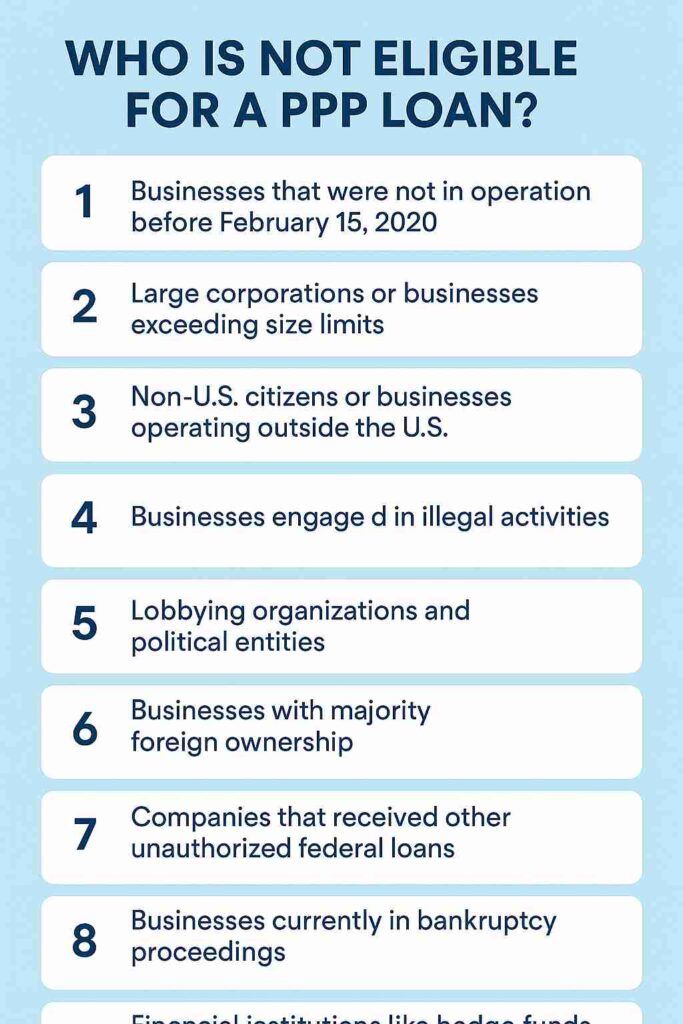The payroll check guarding program (PPP) was introduced as a fiscal rest opening move to help businesses during the COVID 19 epidemic. While many businesses are well qualified, not every something was worthy. Understanding who does not condition for a PPP loan can save time and preclude practical application rejections.
This guide explores the criteria that make businesses and individuals ineligible for a PPP loan, common mistakes that lead to denial, and alternative funding options for those who don’t qualify.
PPP Loan Eligibility Criteria
The PPP loan program was managed by the Small Business Administration (SBA) and had specific requirements for businesses to qualify. Generally, eligible businesses included:
- Small businesses with 500 or fewer employees
- Sole proprietors, independent contractors, and self-employed individuals
- Certain non-profit organizations and veterans’ organizations
However, not all businesses met the eligibility requirements. Below, we discuss who does not qualify for a PPP loan.

Who Is NOT Eligible for a PPP Loan?
1. Businesses That Were Not in Operation Before February 15, 2020
To be eligible for a PPP loan, a business must have been operational before February 15, 2020. If your business was registered or started after this date, you are not eligible.
2. Large Corporations or Businesses Exceeding Size Limits
PPP loans were designed for small businesses. If a company exceeded the SBA’s size standard, it was not eligible. Large corporations with significant financial backing were excluded.
3. Non-U.S. Citizens or Businesses Operating Outside the U.S.
PPP loans were intended for U.S.-based businesses. If a business operates outside the U.S. or if the majority ownership belongs to non-U.S. citizens without lawful residency, the application would be denied.
4. Businesses Engaged in Illegal Activities
Businesses that are involved in illegal activities, as defined by federal law, were automatically ineligible. This included businesses involved in gambling, drug trade (including marijuana-related businesses, even in states where it is legal), and other unlawful enterprises.
5. Lobbying Organizations and Political Entities
Political organizations, lobbying firms, and other entities engaged in influencing legislation were not eligible for PPP loans.
6. Businesses With Majority Foreign Ownership
If more than 20% of the business is owned by individuals who are not U.S. citizens or lawful permanent residents, the business is not eligible for a PPP loan.
7. Companies That Received Other Unauthorized Federal Loans
Businesses that had already received unauthorized federal financial assistance were disqualified from obtaining a PPP loan.
8. Businesses Currently in Bankruptcy Proceedings
If a business had filed for bankruptcy before applying for a PPP loan, it was automatically ineligible. The SBA determined that businesses undergoing bankruptcy proceedings posed too high a risk.
9. Financial Institutions Like Hedge Funds and Private Equity Firms
PPP loans were designed to help businesses keep employees on payroll. Hedge funds, investment firms, and other speculative financial entities were excluded from the program.
10. Business Owners With Recent Criminal Records
Business owners with felony convictions, fraud charges, or financial crimes within the past five years were disqualified from receiving a PPP loan.
Additional Disqualifications for PPP Loans
Even if a business met basic eligibility criteria, other factors could still lead to rejection. These include:
- Fraudulent Applications: Any misrepresentation of information, such as inflating employee numbers, could result in automatic denial.
- Misuse of Previous Relief Funds: Businesses that misused prior federal financial assistance were disqualified.
- Delinquent Federal Loans or Tax Defaults: Businesses with unresolved federal debts were ineligible for PPP loans.
Common Mistakes That Lead to PPP Loan Denial
- Incorrect Documentation: Missing or incorrect documents such as payroll reports or tax filings could lead to rejection.
- Multiple Applications Under Different Business Names: Applying multiple times under different names could be considered fraud and lead to denial.
- Failure to Meet Payroll Requirements: Businesses that did not have proper payroll documentation struggled to get approved.
Alternatives to PPP Loans
If you are not eligible for a PPP loan, there are other funding options available:
- SBA 7(a) Loans – These loans offer financial assistance for small businesses needing long-term funding.
- Economic Injury Disaster Loans (EIDL) – Available for businesses that suffered substantial economic injury.
- Private Business Grants – Many organizations offer grants for small businesses, especially those owned by minorities, women, and veterans.
- State and Local Relief Programs – Many states offer relief funds and grants for small businesses.
Frequently Asked Questions (FAQs)
Can Sole Proprietors Apply for PPP Loans?
Yes, but they must have reported income in tax filings and meet other SBA requirements.
What If I Was Denied a PPP Loan?
You can review the rejection reason, correct errors, and apply for alternative funding options.
Can a Business With Bad Credit Apply for a PPP Loan?
Credit scores were not a determining factor, but businesses with financial issues (e.g., federal tax debt) might have been disqualified.
Conclusion
PPP loan eligibility is crucial for small business owners. If you fall under any of the disqualifying categories mentioned above, you should explore alternative funding sources. Being informed about your options will help you secure financial support for your business when needed.